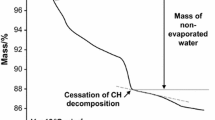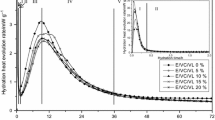Abstract
Polyvinyl alcohols (PVAs) are used commonly in polymer-modified mortars to manipulate their properties. The present work reports the kinetics of hydration of off-white Portland cement pastes modified by PVA (PVA/cement = 0.5 mass%) as a function of the degree of hydrolysis (DH) and the degree of polymerisation (DP). To this end, the hydrolysis of PVAs in extracted cement pore water and in cement paste was analysed using titration method, the heat flow from the hydration of unmodified and PVA-modified cement pastes were monitored over the first 24 h following mixing using isothermal calorimetry, and the Ca(OH)2 (CH) contents of these cement pastes were calculated from thermogravimetric analysis. The results show that PVAs underwent near-complete hydrolysis within the first hour following the mixing of the aqueous PVA solution with cement, i.e., the original PVA was present in the pore solution as fully hydrolysed PVA chains and released acetate groups. Addition of PVA retarded the hydration of C3S to form C–S–H and CH and also the hydration reaction of C3A and gypsum to form ettringite; however, the addition of PVA had no effect on the formation of monosulphate except for the case of samples with high DP and fully hydrolysed PVA was added which resulted in the accelerated formation of monosulphate. The DH and DP of PVA have an important effect on the hydration of Portland cement. The effects of DH resulted from the variations in the amounts of fully hydrolysed PVA and the released acetate groups.








Similar content being viewed by others
References
Singh NB, Rai S. Effect of polyvinyl alcohol on the hydration of cement with rice husk ash. Cem Concr Res. 2001;31:239–43.
Jenni A, Holzer L, Zurbriggen R, Herwegh M. Influence of polymers on microstructure and adhesive strength of cementitious tile adhesive mortars. Cem Concr Res. 2005;35:35–50.
Betioli AM, Gleize PJP, John VM, Pileggi RG. Effect of EVA on the fresh properties of cement paste. Cem Concr Compos. 2012;34:255–60.
Kim J-H, Robertson RE, Naaman AE. Structure and properties of poly(vinyl alcohol)-modified mortar and concrete. Cem Concr Res. 1999;29:407–15.
Mansur AAP, Santos DB, Mansur HS. A microstructural approach to adherence mechanism of poly(vinyl alcohol) modified cement systems to ceramic tiles. Cem Concr Res. 2007;37:270–82.
Georgescu M, Puri A, Coarna M, Voicu G, Voinitchi D. Thermoanalytical and infrared spectroscopy investigations of some mineral pastes containing organic polymers. Cem Concr Res. 2002;32:1269–75.
Stein HN. Influence of some additives on the hydration reactions of Portland cement I. Non-ionic organic additives. J Appl Chem. 1961;11:474–82.
Atkins KM, Edmonds RN, Majumdar AJ. The hydration of Portland and aluminous cements with added polymer dispersions. J Mater Sci. 1991;26:2372–8.
Nguyen DD, Devlin LP, Koshy P, Sorrell CC. Effects of acetic acid on early hydration of Portland cement. J Therm Anal Calorim. 2015. doi:10.1007/s10973-015-4942-0.
Finch CA. Analytical methods for polyvinyl alcohol. In: Finch CA, editor. Polyvinyl alcohol: properties and applications. London: Wiley; 1973. p. 561–72.
Jansen D, Goetz-Neunhoeffer F, Stabler C, Neubauer J. A remastered external standard method applied to the quantification of early OPC hydration. Cem Concr Res. 2011;41:602–8.
Taylor HFW. Cement chemistry. 2nd ed. London: Thomas Telford Ltd. 1997.
Bullard JW, Jennings HM, Livingston RA, Nonat A, Scherer GW, Schweitzer JS, Scrivener KL, Thomas JJ. Mechanisms of cement hydration. Cem Concr Res. 2011;41:1208–23.
Tubbs RK, Wu TK. Thermal properties of polyvinyl alcohol. In: Finch CA, editor. Polyvinyl alcohol: properties and applications. London: Wiley; 1973. p. 167–82.
Moukwa M, Youn D, Hassanali M. Effects of degree of polymerization of water soluble polymers on concrete properties. Cem Concr Res. 1993;23:122–30.
Acknowledgements
The authors are grateful for the financial and technical support as well as the provision of materials by Bostik Australia Pty. Ltd. towards this project. The authors also grateful to Mr. Martin Weiman of Bostik Inc. for the measurements of the heat flow of hydration and to Ms. Thuy Ai Nguyen of Bostik Inc. for the thermogravimetric measurements. The authors also are grateful to Mr. Emmark Eroles of Bostik Australia Pty. Ltd. for provision of the cement and for arranging the gel permeation chromatography (GPC) analysis of the PVA samples. The authors appreciate the assistance of ATC Shanghai for the GPC analysis. The authors also acknowledge the UNSW Analytical Centre for access to X-ray fluorescence analysis. Finally, Duong Dinh Nguyen would like to thank UNSW Australia for the tuition fee waiver scholarship that supported the completion of this work.
Author information
Authors and Affiliations
Corresponding author
Electronic supplementary material
Below is the link to the electronic supplementary material.
Rights and permissions
About this article
Cite this article
Nguyen, D.D., Devlin, L.P., Koshy, P. et al. Effects of chemical nature of polyvinyl alcohol on early hydration of Portland cement. J Therm Anal Calorim 123, 1439–1450 (2016). https://doi.org/10.1007/s10973-015-5076-0
Received:
Accepted:
Published:
Issue Date:
DOI: https://doi.org/10.1007/s10973-015-5076-0




